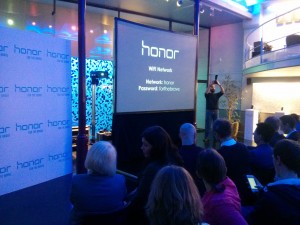CELLPHONES: Huawei’s Honor, ZTE’s Nubia Chase Smartphone Hipsters, Artists
Bottom line: Huawei’s and ZTE’s attempts to cultivate alternative brands with Honor and Nubia could both stand a relatively strong chance of success, though ZTE’s slower, more focused approach looks a bit more prudent.

Chinese smartphone makers Huawei and ZTE (HKEx: 763; Shenzhen; 000063) are trying to shed their stodgy images with newer brands targeting the kind of young trendsetters that have propelled start-up sensation Xiaomi onto the global stage. I got a chance to check out Huawei’s Honor brand phones and ZTE’s Nubia models last week at a major trade show in Spain, where both were trying to show that they can be just as hip and edgy as Xiaomi and Apple (Nasdaq: AAPL), the global leader in trendy, cutting edge smartphones.
Both Honor and Nubia look intriguing, and are separately run from Huawei’s and ZTE’s core smartphone operations in a bid to give them room to develop. Honor is chasing the youthful crowd that marches to the beat of its own drummer, with a tag line of “For the brave,” which was prominently on display at its glitzy event in Barcelona. Nubia is taking a more low-key approach, targeting an artsy crowd with its high-performance cameras aimed at aspiring young photographers and visual artists.
I found both approaches intriguing and think each could succeed, though I’d give a slightly higher chance to Nubia, which formally launched 2 years ago. That’s because Nubia’s target audience seems a bit better defined than Honor’s, which looks a bit broad and very similar to Xiaomi’s web-centric users. Nubia also got a major and unexpected endorsement last year, when China’s stylish first lady Peng Liyuan was spotted using one of the phones while on a trip to Europe with her husband, President Xi Jinping.
I had a chance to talk with top executives from both Nubia and Honor at the Mobile World Congress in Barcelona, who both emphasized the independence they’re getting from their bosses at ZTE’s and Huawei’s larger cellphone divisions. Nonetheless, both brands have quite aggressive targets, even though each also said that getting their phones into the hands of the right buyers is more important than actual sales figures.
Let’s start with Nubia, whose chief Felix Fu said he’s aiming to sell 10 million smartphones this year — double last year’s total and a sizable portion of the broader 60 million smartphones ZTE hopes to sell this year. He showed off some of his phone’s features, including several time-exposure functions that allow uses to create “light paintings”. The phones aren’t cheap, in the 2,000-3,500 yuan range ($400-$550), but also aren’t nearly as pricey as Apple’s iPhones.
Right now Nubia is mostly sold in China, but has recently begun moving into other markets, like the US and developing countries like Russsia, Turkey and Indonesia. This kind of slow, measured strategy looks smart, and last year’s endorsement from China’s first lady has certainly given Nubia some credibility at home. I also like Nubia’s lower key approach, which was apparent in its lack of a glitzy event in Barcelona and Fu’s own low-profile style.
That contrasts sharply with Honor, whose evening soiree in Barcelona featured a throng of international reporters and a slick video of hipsters discussing their decisions to follow personal dreams that were different from conventional career paths. Honor has even coined a slick term for its target buyers, calling them “digital natives” who “would like to be listened to rather than lectured.”
Unlike Nubia, Honor is going after a far wider range of income earners, with models costing as little as $130 under a 2014 promotion, as it seeks to become a brand for young people, regardless of income, the division’s President George Zhao told me at the event. Honor is also expanding more quickly than Nubia, targeting $5 billion in sales this year, or more than double its $2 billion in 2014, the first year in its current form.
If we assume an average price of $300, that translates to a target of some 17 million phone sales this year, far more than Nubia’s target, despite Honor’s shorter history. Honor’s target also translates to a much larger portion of Huawei’s overall smartphone sales, equaling nearly a third of the $16 billion it’s aiming for this year.
Such rapid expansion often results in problems, leading companies to lose their focus as they try to meet their own aggressive targets. The wide range of price points also means that Huawei’s Honor could quickly become a mainstream brand instead of the choice of the edgy crowd it’s seeking. That may not be a bad thing and could even ultimately see Honor become Huawei’s flagship brand of the future, but it could also undermine its attempts to cultivate the edgier, hipster image it’s pursuing.
Related posts:
NOT FOR REPUBLICATION
